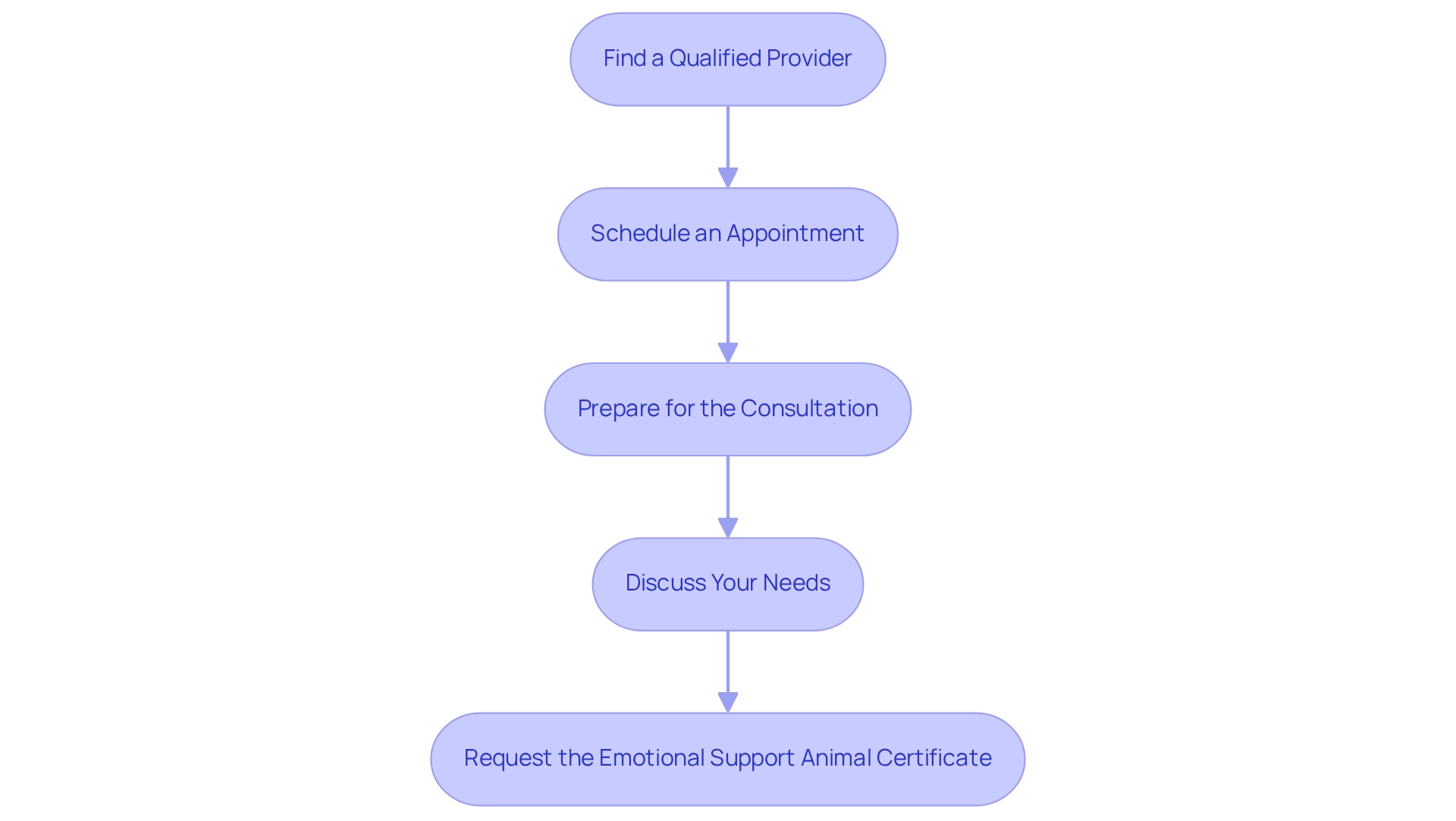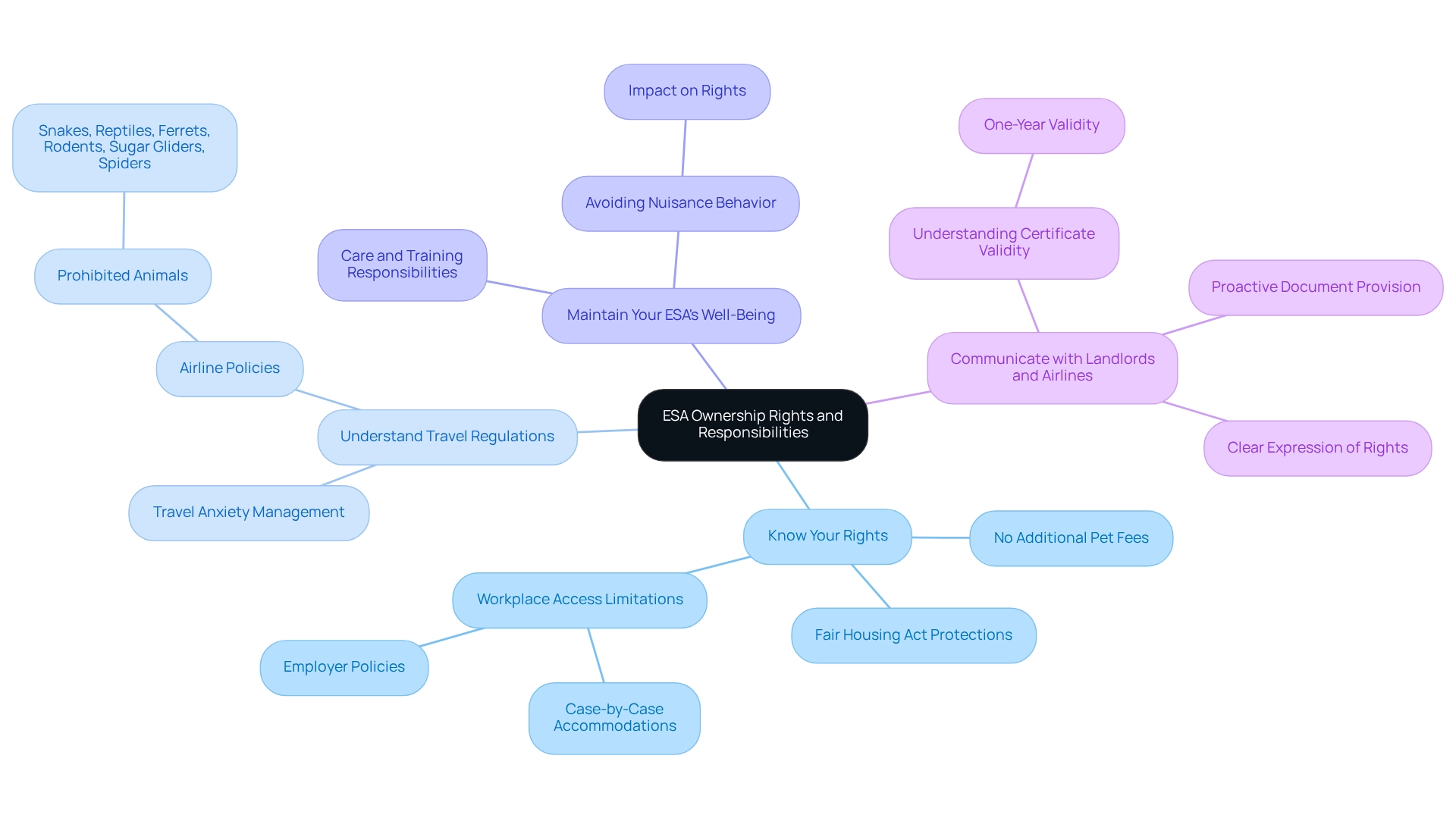

4 Steps to Obtain Your Emotional Support Animal Certificate
by Lena Park
Last updated: July 11, 2025
Verified and Approved by:
Angela Morris,
MSW, LCSW
Fact Checked

Overview
Obtaining your emotional support animal certificate can feel overwhelming, especially when navigating the complexities of mental health. It’s essential to first assess your eligibility by identifying your mental health condition. This involves consulting diagnostic criteria and documenting your experiences, which can be a challenging process.
- Seeking the guidance of a licensed medical professional is a crucial step in this journey, as they can issue the certificate you need.
- This article outlines these steps with care, emphasizing the importance of thorough self-assessment and professional consultation.
- Remember, you are not alone in this process, and taking these steps is a significant move towards securing the support you deserve for your emotional well-being.
Introduction
In a world where mental health challenges are increasingly prevalent, many individuals find themselves grappling with feelings of anxiety, depression, and PTSD. These emotional struggles can feel overwhelming and isolating. However, in this journey, Emotional Support Animals (ESAs) can offer a beacon of hope. These beloved companions provide not just companionship, but also invaluable therapeutic benefits that can make a significant difference in one’s daily life.
Yet, the path to obtaining an ESA is not always straightforward. It involves:
- Understanding eligibility criteria
- Navigating consultations with licensed professionals
- Being aware of one’s rights and responsibilities as an ESA owner
This guide aims to empower you by unpacking the essential steps for assessing eligibility, securing an official ESA letter, and ensuring a smooth experience in housing and travel.
Imagine the comfort of having a loyal companion by your side, one that understands your struggles and offers unwavering support. With the right information and guidance, you can embrace the support that your emotional companion offers, opening the door to a more fulfilling life.
Assess Your Eligibility for an Emotional Support Animal
To determine your eligibility for an emotional support animal certificate, it’s important to carefully and thoughtfully follow these essential steps.
- Identify Your Mental Health Condition: Many individuals face challenges such as anxiety, depression, and PTSD. Reflect on your psychological background and current difficulties to gain a clearer understanding of your situation.
- Consult Diagnostic Criteria: Familiarize yourself with the DSM-5 (Diagnostic and Statistical Manual of Mental Disorders) criteria. Understanding these guidelines can help you see if your condition aligns with recognized psychological concerns that may benefit from an ESA.
- Self-Assessment: Consider using self-assessment quizzes or questionnaires available online to evaluate your emotional well-being. These resources can provide valuable insights into your need for an ESA and help clarify your circumstances.
- Document Your Experiences: Keeping a journal of your emotional struggles and how they affect your daily life can be incredibly helpful. This documentation will serve as a vital tool when discussing your needs with a medical professional, offering concrete examples of your experiences, including the emotional support animal certificate.
Wellness Wag provides a streamlined online process for obtaining legitimate ESA letters through telehealth services, making it easier for you to access the support you deserve. Recent studies show that many individuals seek ESAs for support, particularly during challenging times. Notably, during the COVID-19 pandemic, 66% of ESA owners received their certification after the crisis began, with 62% reporting improved well-being compared to just 19% of those without an ESA. This highlights the crucial role ESAs play in offering emotional support, especially during difficult periods. As Jonalyn Dionio noted, a study by Chin et al. (2023) found that having pets was associated with enhanced psychological well-being during the pandemic. Mental wellness experts emphasize that qualifying conditions for ESAs center on the need for therapeutic companionship, making it essential to thoughtfully assess your eligibility. The growing reliance on ESAs and service dogs underscores their vital role in emotional support and public well-being.
Consult with a Licensed Medical Professional
To successfully consult with a licensed medical professional, it’s important to approach the process with care and understanding. Here are some steps to guide you:
- Find a qualified provider who can issue an emotional support animal certificate: Seek out a licensed professional in behavioral science (LMHP), such as a psychologist, psychiatrist, or certified therapist, who specializes in emotional support animals. Their expertise is vital for understanding the nuances of the emotional support animal certificate certification and how it can support your emotional needs.
Schedule an Appointment: Reach out to the provider to arrange a consultation. When you communicate your intention to discuss obtaining an ESA letter, it sets the stage for a focused and meaningful conversation. - Prepare for the Consultation: Take time to gather your self-assessment results, journal entries, and any relevant medical history. This documentation will provide the professional with a thorough perspective on your psychological challenges and needs.
Discuss Your Needs: During the consultation, be open about your psychological concerns and express how an ESA could enhance your well-being. Honest and thorough communication is essential for the professional to assess your situation accurately. - Request the emotional support animal certificate: If the professional determines that you meet the criteria, kindly ask for an emotional support animal certificate that outlines your requirement for an emotional support animal as part of your treatment plan. This letter is crucial for securing housing and travel arrangements without facing extra charges or limitations.
Consulting with a qualified expert not only assures you of obtaining a legitimate ESA letter but also fosters a nurturing atmosphere where your psychological needs are prioritized. At Wellness Wag, we understand the importance of this process and streamline it by offering a quick assessment tailored to your specific emotional support needs. After submitting the required forms, we connect you with a licensed medical doctor for a personalized consultation, ensuring a smooth and professional experience.
Additionally, Wellness Wag provides benefits such as no pet deposit and no pet rent fee, making it easier for you to live with your emotional support animal. Research indicates that 15.1% of ESA dog owners report additional relief services offered by their pets, underscoring the significant impact of emotional support animals on mental well-being. Previous studies have shown that general dog ownership can help reduce stress levels and improve mood.
Furthermore, Wellness Wag has introduced pet insurance options, enhancing the range of services available to pet owners and providing comprehensive support for managing your pet’s health and well-being. We are here to support you on this journey, ensuring you feel cared for and understood.

Receive Your Official ESA Letter Within 24 Hours
If you’re navigating the challenges of mental health, know that you’re not alone. After consulting with a licensed professional and receiving approval, you can swiftly obtain your ESA letter by following these steps:
- Confirm the details.
It’s important to verify that the emotional support animal certificate includes your name, the date of issuance, the professional’s license number, and a clear statement outlining your need for an ESA. These details are crucial for the document’s validity and your peace of mind. - Obtain the document.
Most licensed professionals will send the ESA document electronically within 24 hours of approval. This swift turnaround is essential; prompt access to your ESA document can significantly impact your ability to secure housing or travel arrangements. Wellness Wag is committed to ensuring clients receive their correspondence swiftly, demonstrating their dedication to an efficient process. The waiting period is designed to uphold the integrity of ESAs as vital mental health support and to prevent misuse of ESA documentation. - Review the document carefully.
Take the time to thoroughly examine it to ensure all information is accurate and complete. This document serves as your official proof for housing and travel, and any discrepancies regarding your emotional support animal certificate could lead to unnecessary complications. - Store the document safely.
Keep both digital and physical copies of your ESA document in a secure location. You may need to present it to landlords or airlines, so having it readily accessible is crucial for your comfort and confidence.
To begin your emotional support animal certificate registration, simply answer a few brief questions about your ESA requirements. With budget-friendly pricing starting at only $32.25 and interest-free payment options available at checkout, acquiring your emotional support animal certificate has never been easier. The importance of timely delivery cannot be overstated; it facilitates immediate access to necessary accommodations and upholds the integrity of ESAs as legitimate forms of mental health support. With over 50,000 patients attended to, Wellness Wag demonstrates efficiency in this process, ensuring clients receive their notifications swiftly and accurately.
As one pleased client, William J., shared, “I reached out to this telemedicine clinic to obtain my ESA document via a video call. Their service level was top notch, and the entire process was streamlined, efficient, and professional. It was very convenient, way easier than I expected.” This commitment to rapid service is reinforced by professional insights, emphasizing that timely ESA document delivery is essential for individuals facing mental health difficulties.
Understand Your Rights and Responsibilities as an ESA Owner
As an ESA owner, understanding your rights and responsibilities related to the emotional support animal certificate is crucial for ensuring a harmonious living and travel experience. Many individuals face emotional challenges that can be alleviated with the support of an emotional support animal certificate, and knowing how to navigate these situations can provide peace of mind.
Know Your Rights: Under the Fair Housing Act, you are entitled to reside with your ESA in housing that typically prohibits pets. This is a vital protection for your emotional well-being, as landlords cannot impose additional pet fees for ESAs, allowing you to seek comfort without financial burden. However, it’s important to remember that federal law does not grant ESAs automatic access to workplaces; accommodations must be requested on a case-by-case basis, depending on employer policies, as highlighted in the case study “Workplace Rights for ESA Owners.”
Understand Travel Regulations: Traveling with your ESA can be a source of anxiety, especially since airlines have specific policies that can vary significantly. For instance, certain animals, such as snakes, reptiles, ferrets, rodents, sugar gliders, and spiders, may not be permitted on flights, even if the airline allows ESAs. Familiarizing yourself with these regulations is essential for smooth travel with your beloved companion, helping to ease your worries.
Maintain Your ESA’s Well-Being: As an ESA owner, you bear the responsibility for your animal’s care, training, and behavior. It is vital to ensure that your ESA is well-behaved and does not become a nuisance to others, as this can impact your rights under housing and travel regulations. As Zoe Harper, a marketing professional, states, “Having an ESA comes with the responsibility to ensure that the animal does not become a nuisance or a source of discomfort for other tenants.”
Communicate with Landlords and Airlines: Proactively providing your ESA document when required and clearly expressing your rights can help avoid misunderstandings. This is particularly important since the emotional support animal certificate is valid for one year from the date of issue, and being aware of this duration helps maintain your rights. Remember, you are not alone in this journey; being informed and proactive can empower you.
By embracing this knowledge and taking thoughtful steps, you can navigate the complexities of ESA ownership effectively, ensuring that both you and your animal can enjoy the profound benefits of companionship and support.

Conclusion
Emotional Support Animals (ESAs) play a vital role in uplifting the mental health and well-being of individuals grappling with conditions such as anxiety, depression, and PTSD. The journey to obtaining an ESA often begins with a personal assessment of eligibility, which involves recognizing mental health challenges, consulting diagnostic criteria, and documenting individual experiences. This foundational understanding is essential as it paves the way for a meaningful consultation with a licensed mental health professional, who can provide the necessary ESA letter that validates the need for such support.
Once the ESA letter is in hand, it becomes crucial to understand the rights and responsibilities that accompany being an ESA owner. Awareness of legal protections under the Fair Housing Act and travel regulations empowers individuals to navigate housing and travel situations with confidence, minimizing unnecessary obstacles. Moreover, ensuring the well-being and proper training of the ESA is fundamental in upholding these rights and nurturing a positive environment for both the owner and the animal.
Ultimately, integrating an ESA into one’s life can lead to profound improvements in emotional health and daily functioning. By following the outlined steps—from assessing eligibility to grasping rights and responsibilities—individuals can fully embrace the companionship and support that ESAs provide, opening the door to a more fulfilling and balanced life. While the journey may present its complexities, the rewards of having a loyal emotional support companion are truly worth the effort. Have you considered how an ESA might transform your life? Remember, you are not alone in this journey, and the support you seek is within reach.
Frequently Asked Questions
What are the steps to determine eligibility for an emotional support animal certificate?
The essential steps include identifying your mental health condition, consulting diagnostic criteria, conducting a self-assessment, and documenting your experiences.
How can I identify my mental health condition?
Reflect on your psychological background and current difficulties, such as anxiety, depression, or PTSD, to gain a clearer understanding of your situation.
What is the DSM-5 and how does it relate to emotional support animals?
The DSM-5 (Diagnostic and Statistical Manual of Mental Disorders) provides criteria for recognized psychological concerns. Familiarizing yourself with these guidelines can help you determine if your condition may benefit from an emotional support animal.
Are there any resources for self-assessment regarding emotional well-being?
Yes, there are self-assessment quizzes and questionnaires available online that can help evaluate your emotional well-being and clarify your need for an emotional support animal.
Why is documenting my experiences important?
Keeping a journal of your emotional struggles and their impact on your daily life can provide concrete examples to discuss with a medical professional when seeking an emotional support animal certificate.
How does Wellness Wag assist in obtaining an emotional support animal certificate?
Wellness Wag offers a streamlined online process for obtaining legitimate ESA letters through telehealth services, making it easier for individuals to access the support they need.
What statistics highlight the importance of emotional support animals during challenging times?
Recent studies show that 66% of ESA owners received their certification during the COVID-19 pandemic, with 62% reporting improved well-being compared to only 19% of those without an ESA.
What role do emotional support animals play in mental wellness?
Emotional support animals provide therapeutic companionship, which is crucial for individuals facing mental health challenges, particularly during difficult periods.
Certify Your Emotional Support Animal Today

Why You Can Rely on Us?
At Wellness Wag, we believe your pet deserves care rooted in both science and compassion. Each article is carefully researched, written in clear language for pet owners, and then reviewed by qualified professionals to ensure the information is evidence-based, current, and practical for real-life care. Our goal is to help you feel confident in making informed decisions about your pet’s health and well-being.
Reviewed by
Angela Morris, MSW, LCSW
Angela is a licensed clinical social worker with 20 years of experience in patient advocacy and community mental health. She has assisted numerous clients with ESA evaluations and brings a deep understanding of disability accommodations, ensuring that all information is accurate, supportive, and practical.

Written by :
Lena Park
Last Updated :
July 11, 2025












